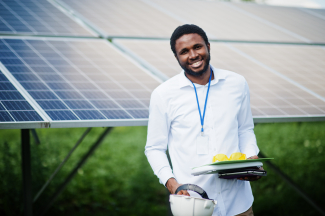FILTER
Displaying 1 - 10 of 25 publications
Abstract Climate change mitigation is often assumed to be cheaper in developing countries than in developed countries. Yet, existing analyses frequently ignore the cost-effectiveness of price-based…
| EfD Discussion Paper | India, Ghana, KenyaKey Messages With carbon pricing, households in most countries and regions have a tendency to change from fossil-based fuels to more traditional and polluting alternatives like firewood and charcoal…
| Research Brief | India, Ghana, KenyaAbstract Carbon pricing has been proposed as an efficient instrument to reduce carbon emissions and curb climate change. However, in low-income countries, resulting high energy prices might induce…
| Peer Reviewed |Abstract Policymakers frequently voice concerns that carbon pricing could impair economic development in the short run, especially in low-income countries such as Uganda. Using a consumer demand…
| Peer Reviewed | IndiaAbstract Implementing emissions pricing in developing countries calls for increased focus on the political, economic, and social challenges these countries face. By discussing various types of…
| Peer Reviewed | Global HubIdentifying policies and the corresponding actors, processes, and methods that enable the creation of a policy environment are important to put climate and low-carbon energy transition policies in…
| Report |Abstract One reason carbon prices are difficult to implement is that they might impose high costs on poor and vulnerable households. In response, studies often highlight that recycling revenues…
| Discussion Paper |Aligning development and climate goals means Africa’s energy systems will be based on clean energy technologies in the long term, but pathways to get there are uncertain and variable across countries…
| Peer Reviewed |Abstract Carbon taxes and fossil fuel subsidy reforms have been recognized as an efficient means to mobilize substantive domestic resources for sustainable development. Yet, despite their advantages…
| Peer Reviewed | NigeriaThis volume provides an overview of the political economy of coal in diverse country contexts. Coal is the largest source of greenhouse gas emissions globally, accounting for about 40 percent of…
| Books, EfD/RFF Book |Pagination
- 1
- 2
- 3
- Next ››
- Last Last »

